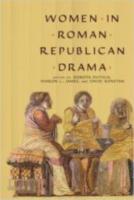
Wisconsin (2015) p/b 260pp, £34.93 (ISBN 9780299303143)
There are eleven essays in this anthology, as well as an excellent introduction which establishes the reasons for, and purpose of the collection, the state of current scholarship in the subject, and a summary of each of the contributions. The three sections into which the chapters are divided are entitled Females in Performance, Women in Roman Drama and Society, and Receptions.
There was a gap in the shelves of Latin Literature, Roman Social History and Theatre Studies which this book goes a significant way to fill with a generally accessible volume (most of the Latin, if quoted, is translated) which combines theoretical insights with breadth of coverage. It is interesting to see what the editors have chosen to exclude and what to include: ‘Republican’ means that there is no chapter on Seneca’s tragedies, for instance; ‘Drama’ means that the focus is not exclusively on the comedies of Plautus and Terence, although the surviving texts mean that these inevitably feature most prominently; but the most important word in the book’s title is its first—all the essays have the female characters as their main theme, either as individuals or, more commonly, in relationships as daughter, lover, wife, mother, courtesan, etc.
The ‘Receptions’ section contains contributions on Machiavelli, whose Mandrogola combines aspects of the Greek and Roman New Comedy with Lucretia from Livy’s Book 1; on Shakespeare—the influence of the Roman meretrices or brothel keepers on plays such as All’s Well That Ends Well and Comedy of Errors—filtered through the new (to me) concept of the theatergram (sic) which is defined as ‘a dramaturgic element that exists within a common repertoire and is subject to permutation, combination and gradual evolution’; and on a puppet opera by the Brazilian playwright, José da Silva, called Anfitrião ou Júpiter e Alcmena, based on Plautus’s Amphitruo, and giving Juno a role that undercuts the male domination and creates a female triumph for a change. Particularly enjoyable were the two essays which dealt with women in genres other than the Greek-inspired comedy of Plautus and Terence: Jarrett Welsh on fabulae togatae (comedies in Roman settings) in which the female characters have more varied and different lives with a greater range of possible outcomes; and Gesine Manuwald on fabulae crepidatae (Roman tragedies) in which characters from Greek myths and legends are depicted with contemporary Roman values. However, the nature of the surviving material means that these topics are handled with much speculative interpretation of fragmentary quotations from later authors; this may go some way to explain why there has only previously been one article specifically devoted to women in Republican tragedy.
For the rest there are interesting discussions of the language used by female characters and how it reflects their status (by Sharon L. James), on the way that pairs of women work collaboratively in some plays (by Anne Felovitch), on issues concerned with the portrayal of female characters by male actors (by Amy Richlin), among other engaging themes. ‘The youthful wild oats of sons, the violent passions of mercenary soldiers, the lecherous wanderings of husbands’ (p. 102) are themes which continue to interest novelists, screenwriters and playwrights and which are discussed from the female (victims’?) perspective in this valuable and important study.
Stephen Chambers—Balliol
